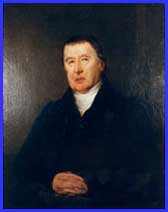June 14: Samuel Blair
June 2: Archibald Alexander
May 19: A Sermon by Rev. Ashbel Green
 Born in Hanover Township, New Jersey on July 6, 1762, Ashbel Green grew to become one of the more notable Presbyterians in the early years of this nation. During the Revolutionary War, he served with the New Jersey militia. Following the War, he studied theology under the Rev. John Witherspoon and graduated from the College of New Jersey (later Princeton University) in 1783. From 1792 to 1800, he served as Chaplain for the U.S. House of Representatives. And from 1812 to 1822, he served as President of the College of New Jersey. Rev. Green, who was closely tied to the establishment of the Princeton Theological Seminary, died on May 19, 1848.
Born in Hanover Township, New Jersey on July 6, 1762, Ashbel Green grew to become one of the more notable Presbyterians in the early years of this nation. During the Revolutionary War, he served with the New Jersey militia. Following the War, he studied theology under the Rev. John Witherspoon and graduated from the College of New Jersey (later Princeton University) in 1783. From 1792 to 1800, he served as Chaplain for the U.S. House of Representatives. And from 1812 to 1822, he served as President of the College of New Jersey. Rev. Green, who was closely tied to the establishment of the Princeton Theological Seminary, died on May 19, 1848.
Today’s sermon comes from a volume of Rev. Green’s, titled Practical Sermons, published in 1834.
SERMON.
CHRIST A ROCK.
1 Cor. 10:4 – “For they drank of that spiritual rock that followed them, and that rock was Christ.“
By figurative representations some of the most important instructions of divine revelation are communicated. Under the typical dispensation of Moses especially, there was scarcely any public act, occurrence or institution, which did not import more than at first appeared; and while it served some obvious present purpose, did not point also to some more remote and hidden, but yet more spiritual and important object or end. This spiritual signification of the ancient Jewish symbols, though it was often perceived, and was highly beneficial to the believing Israelites, was not intended merely, nor perhaps principall, for their benefit. It is under the gospel dispensation that the intention of all the types is most clearly unfolded; so that by viewing them in retrospect, and with the advantage derived from the light of the gospel, more may be discovered by a Christian than could be known to a Jew.
To aid us in this useful investigation, the inspired writers of the New Testament often become our teachers and guides. They frequently advert to the Hebrew scriptures for the illustration and enforcement of what they deliver: and thus by a kind of double revelation, the wisdom of God is most conspicuously displayed, the faith of believers most powerfully confirmed, the beauty of sacred truth most engagingly exhibited, and its whole design most fully accomplished. Among innumerable passages which show the truth of this representation, the text [1 Cor. 10:4] is one of the most striking.
The apostle labours in the context to excite a holy circumspection in the Corinthian Christians, lest slighting or misimproving their peculiar privileges, they should lose the blessings which these privileges were calculated to convey. With this view, he points their attention, both for encouragement and warning, to the history of the people of Israel under the conduct of Moses in the wilderness. Speaking, in this connexion, of the miraculous supply of water which followed them on their journey, he denominates it “spiritual drink;” and then to explain the reason of his giving it this appellation, he says—”For they drank of that spiritual rock that followed them, and that rock was Christ.” By a figure of speech, too frequent in its use and too obvious in its import to be misapprehended, the people are here said to have drunk of the rock that followed them, instead of the water which flowed from it; and comprehensive metaphor which is used, when the apostle affirms that this rock was Christ.
To unfold the intention of this metaphor, and explain and apply the design of the whole expression, is the object of the present discourse. In doing this, it will be useful, in order to avoid the danger of torturing the figurative language of the inspired penman to a meaning foreign to his own, to consider attentively the spiritual truth intended to be conveyed; to state this truth distinctly and summarily at once; and then to recall the sensible images, only for the purpose of illustration or enforcement. Agreeably to this, let it be carefully remarked, that there are three distinct things comprehended in the type we consider. First,—The rock, which was the source, or fountain, from which the water flowed: Secondly—The streams themselves, by which the thirst of the people was allayed, and their strength invigorated: Thirdly—The ultimate object for which the whole was done; namely, to conduct the Israel of God to the promised land. Now, as the apostle asserts that this rock was Christ, I think the propositions of evangelical truth corresponding to the sensible and temporal things just stated, are plainly the three following—
I. That the believer’s hope of salvation must derive its very origin from Christ Jesus, or be placed on him alone.
II. That a resort must constantly be made to the never-failing fulness of the Saviour, for all those supplies of grace and strength, which are necessary to refresh and invigorate the Christian, in his passage through the world.
III. That the ultimate design, and the sure result of all, is, that the faithful disciple of Christ shall at length possess the heavenly inheritance.
